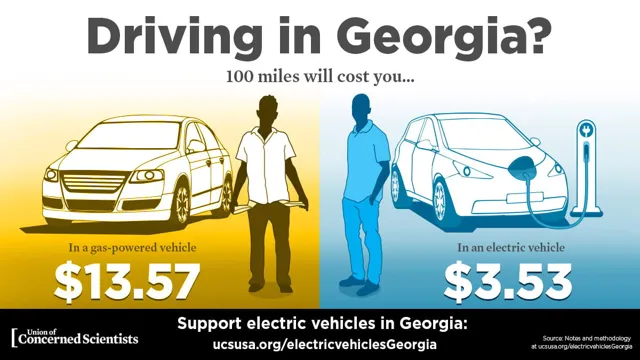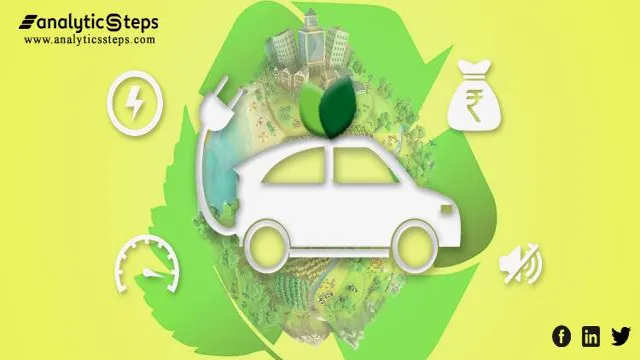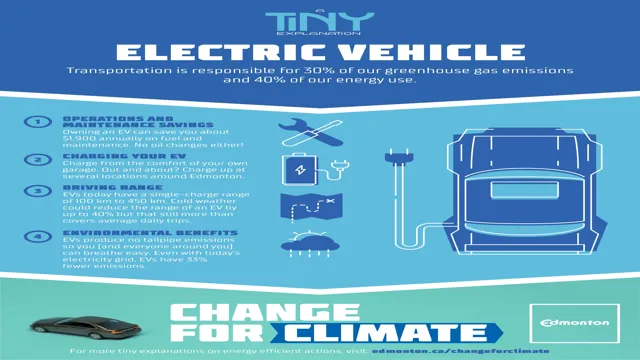Saving Money and the Environment: The Financial Benefits of Driving an Electric Car
Electric cars have undoubtedly come a long way since their introduction to the market. With advancements in technology, electric vehicles have now become a viable option for car buyers who are looking to cut down on their fuel expenses and make a positive impact on the environment. However, what many people don’t realize is that electric cars have proven to be financially advantageous as well.
Investing in an electric car not only saves money on fuel but also provides an array of financial benefits that can help car owners save money in the long run. In this blog post, we will be discussing the various financial benefits of electric cars that are often overlooked but can prove to be significant. So, fasten your seatbelt, and let’s dive into the world of electric cars and their financial perks.
Lower Operational Costs
One of the most significant financial benefits of electric cars is their lower operational costs. Electric vehicles are powered by batteries, which can be charged at home or at public charging stations for a fraction of the cost of gasoline. EVs also require less maintenance than traditional gas cars, mainly due to the absence of a combustion engine.
There are no oil changes, spark plug replacements, or emissions control systems to maintain, resulting in lower ongoing costs. Moreover, electric cars have regenerative braking systems which return energy to the battery as the car slows down, reducing wear on brake pads and further reducing maintenance costs. These factors mean that electric cars can save drivers hundreds or even thousands of dollars in operating costs and make them more financially attractive in the long run.
So, if you’re looking to save money on transportation while also being eco-friendly, investing in an electric car could be the perfect choice.
Electricity is Cheaper Than Gasoline
When it comes to operating costs, electric vehicles have a major advantage over gasoline-powered ones. Electricity is simply cheaper than gasoline. The cost of electricity per mile driven is significantly lower than the cost of gasoline per mile driven.
This means that electric vehicles have lower operational costs which can save you a lot of money in the long run. Think about it this way – maintaining an electric car is like having a water bill, while maintaining a gasoline car is like having a water bill and buying bottled water every week. The cost of gasoline adds up quickly and can start to feel like a burden, especially if you drive long distances often.
However, with an electric car, you can save hundreds or even thousands of dollars a year just by not needing to buy gasoline. Plus, many electricity providers offer discounted rates for charging your electric car during off-peak hours, making it even more cost-effective. In addition to the cost savings, electric cars also have reduced emissions and are better for the environment.
By driving electric, you can help decrease your carbon footprint and contribute to a cleaner planet. All in all, it’s clear to see that choosing an electric car over a gasoline-powered car is not only better for your wallet but also for the world we live in.
Fewer Maintenance Costs
When it comes to operating heavy machinery like construction equipment, it’s crucial to consider the maintenance costs of the equipment in addition to the actual purchase price. Thankfully, with newer equipment, there are often fewer maintenance costs than older models. Lower operational costs can result in more money saved for the business, which can then be used for other investments or upgrades.
By investing in newer equipment, businesses can save money in the long run by having to pay less for maintenance. Plus, newer equipment typically has improved features and technology, which can lead to higher efficiency and productivity on the job site. All in all, by weighing the upfront cost versus the long-term savings, it becomes clear that investing in newer equipment is a smart decision for a business looking to save money and improve operations.
Tax Credits and Incentives
If you’re considering an electric car, there are plenty of financial benefits that come with it. One of the biggest advantages is the available tax credits and incentives. In the US, federal tax credits can range from $2,500 to $7,500, depending on the vehicle’s battery size.
Additionally, many states offer their own incentives, such as rebates, tax deductions, and HOV lane access. These incentives can make an electric car more affordable, and they can help offset the higher upfront costs. Beyond tax benefits, electric cars are also generally cheaper to operate and maintain than traditional gas-powered vehicles.
While they may have a higher sticker price, you’ll save money in the long run on fuel costs and maintenance expenses. Not to mention the environmental benefits of driving an electric car, such as reduced emissions and a smaller carbon footprint.
Federal Tax Credits
Federal Tax Credits If you are looking to save money on your federal taxes while investing in renewable energy, then federal tax credits may be the solution for you. Tax credits and incentives offer tax breaks for qualifying solar photovoltaic systems, wind energy systems, and geothermal heat pumps. This means that you can save money on your taxes by installing green energy systems in your home or business.
In addition to federal tax credits, you may also be eligible for state and local incentives, which can further reduce the cost of your renewable energy system. By taking advantage of these incentives, you can save money while also reducing your carbon footprint. So why not invest in your future and the environment at the same time? Consider researching tax credits and incentives to see if they can benefit you.
State and Local Incentives
State and local incentives can be a game-changer for businesses looking to expand or relocate. One incentive that can make a huge difference is tax credits. Many states and municipalities offer tax credits for businesses that meet specific requirements, such as creating jobs or investing in capital equipment.
These tax credits can significantly reduce a company’s tax liability, making it more financially feasible to grow the business. In addition to tax credits, there are a variety of other incentives available depending on the state or municipality. These may include grants, low-interest loans, and even training programs.
Some states may also offer reduced utility rates or expedited permitting processes for qualifying businesses. By taking advantage of these incentives, businesses can save money, increase profits, and better position themselves for long-term growth. It’s important for businesses to do their research and identify the incentives that are available to them.
Working with economic development or business development organizations can be a great way to learn more about what’s available and how to access it. With the right incentives in place, businesses can thrive and help boost the overall economy of their state or municipality. So, if you’re thinking about expanding or relocating your business, it’s worth exploring the various incentives that may be available to you.
HOV Lane Access
One of the perks of owning an electric vehicle is the ability to access HOV lanes, which can save you valuable time on your daily commute. But did you know that some states also offer tax credits and incentives for electric vehicle owners? Depending on where you live, you could be eligible for a tax credit of up to $7,500 or more. Additionally, some states offer incentive programs, such as rebates for electric vehicle charging infrastructure or discounted registration fees.
These incentives not only make electric vehicles more affordable but also encourage more people to switch to cleaner transportation options. So, if you’re considering buying an electric vehicle, be sure to research the tax credits and incentives available in your state – it could make a big difference in your decision.
Resale Value
One major financial benefit of owning an electric car that often gets overlooked is the resale value. Electric cars tend to hold their value better over time compared to traditional gas-powered vehicles. This is due to several reasons, such as the fact that electric cars have a longer lifespan and require less maintenance overall.
Additionally, as more people become environmentally conscious, there is a rising demand for electric cars in the market, which also contributes to their higher resale value. So not only can you save money on gas and maintenance costs while owning an electric car, but you can also potentially sell it for a higher price in the future. It’s a win-win situation for both your wallet and the environment.
Electric Cars Hold Their Value Better
When it comes to resale value, electric cars are ahead of the game. Unlike traditional gas-powered vehicles, electric cars hold their value better due to a variety of factors. Firstly, electric cars have lower operating costs, making them more appealing to potential buyers in the used car market.
Additionally, as more people switch to electric cars, the demand for used electric cars is increasing, driving up their resale value. Electric cars also tend to have longer lifespans, which means they are less likely to require expensive repairs and maintenance, further boosting their value. If you’re looking for a car that will hold its value in the long run, an electric car might be the right choice for you.
Demand is Increasing
When it comes to buying a car, resale value is a crucial factor to consider. As demand for cars continues to increase, so does the importance of resale value. Having a car with a high resale value means that you can get a better return on your investment if you decide to sell it in the future.
The good news is that many factors can affect a car’s resale value, and owning a popular model or keeping it in good condition can boost its value significantly. However, some cars tend to hold their value better than others, so it’s essential to do your research and choose a make and model that has a reputation for retaining value over time. Another factor that can affect resale value is changes in technology, as newer and more advanced features can quickly make older models seem outdated.
Keeping your car up to date with the latest features and technology can help you maintain its value, but it’s also essential to stay ahead of any potential changes that could impact the resale market. Ultimately, owning a car with strong resale value can be an excellent investment, providing both security and peace of mind. By doing your research and taking care of your vehicle, you can maintain its value and enjoy the benefits of a high resale price if and when the time comes to sell.
So if you’re in the market for a new car, be sure to consider resale value as a crucial factor in your decision-making process.
Reduced Environmental Costs
When it comes to buying an electric car, there are various financial benefits that come along with it, especially regarding reduced environmental costs. Electric cars have significantly lower greenhouse gas emissions compared to traditional gas-run cars, which is great news for the environment. Besides helping to reduce one’s carbon footprint, electric cars can also help drivers save money through lower costs of maintenance and fuel prices.
Charging an electric car is much cheaper than fueling up a traditional car, and with more electric charging stations popping up across the country, it is easier than ever to find a charging station. Additionally, electric cars require less maintenance since they have fewer moving parts that can malfunction, making them a more cost-effective option in the long run. Ultimately, the financial and environmental benefits make electric cars a wise investment for those looking to reduce their carbon footprint and save some money in the process.
Conclusion
In conclusion, the financial benefits of electric cars are shocking- ly advantageous. From lower fuel costs to tax incentives, electric cars offer a plethora of ways to save money. Not to mention, the environmental benefits of reducing emissions and contributing to a sustainable future.
So, if you’re ready to power up your wallet while also contributing to a cleaner and greener planet- an electric car is the perfect spark to ignite your financial journey.”
FAQs
What are some of the financial benefits of owning an electric car?
Some of the financial benefits of owning an electric car include lower fuel and maintenance costs, potential tax incentives, and access to carpool lanes in some states.
Are electric cars more expensive to purchase than traditional gas-powered cars?
In general, electric cars are more expensive to purchase than traditional gas-powered cars. However, factoring in the potential for lower fuel and maintenance costs, the total cost of ownership over time may be less.
Is it possible to save money by charging an electric car at home instead of using public charging stations?
Yes, charging an electric car at home is often cheaper than using public charging stations, especially if you charge during off-peak hours when electricity rates are lower.
Can I get tax incentives for purchasing an electric car?
Yes, there are federal tax incentives available for purchasing an electric car, as well as potential state-level incentives. These incentives can help offset the higher purchase price of an electric car and make it more financially feasible.




